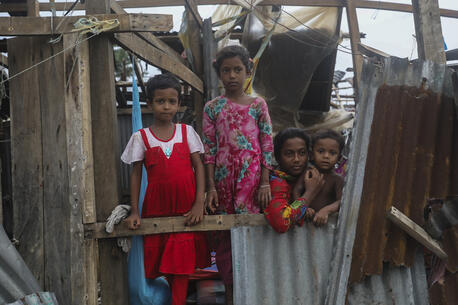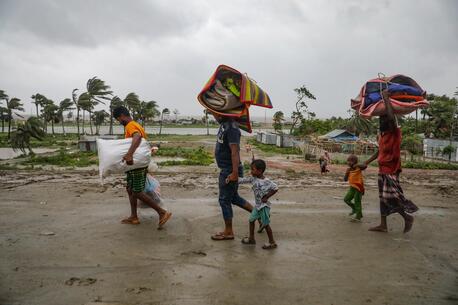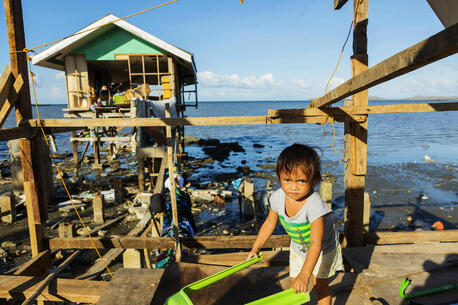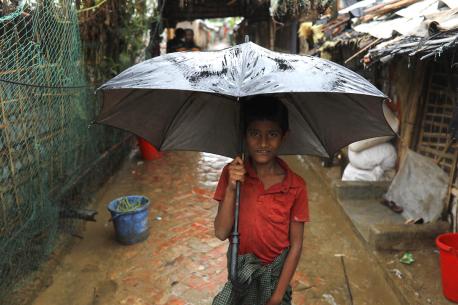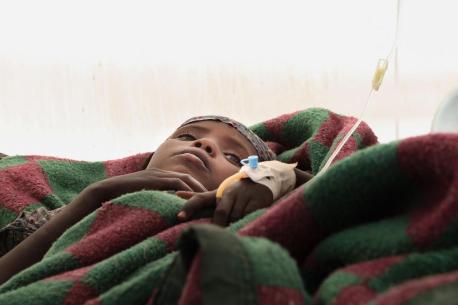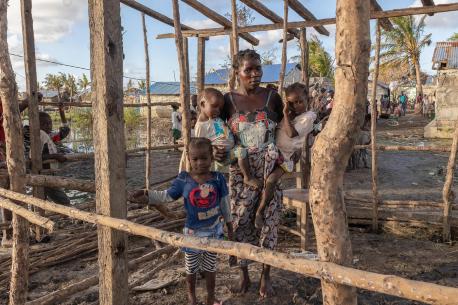
UNICEF in Mozambique
Children and their families are paying the price of multiple crises in Mozambique: climate-driven disasters, conflict, poverty and disease. Learn what UNICEF is doing to help meet urgent needs.
Multiple humanitarian crises impacting children in Mozambique
Children's lives have improved in the southeast African nation of Mozambique since the early 2000s. More children are surviving past their 5th birthday. More children are able to access safe water. There are laws protecting children's rights to education and birth registration and prohibiting child marriage.
Despite this progress, the country remains one of the toughest places to be a child.
Ever-present dangers include protracted conflict in the north and extreme weather, from cyclones to droughts. There have been cholera and polio outbreaks. The cost of living is high. Nearly half of all children live in poverty.
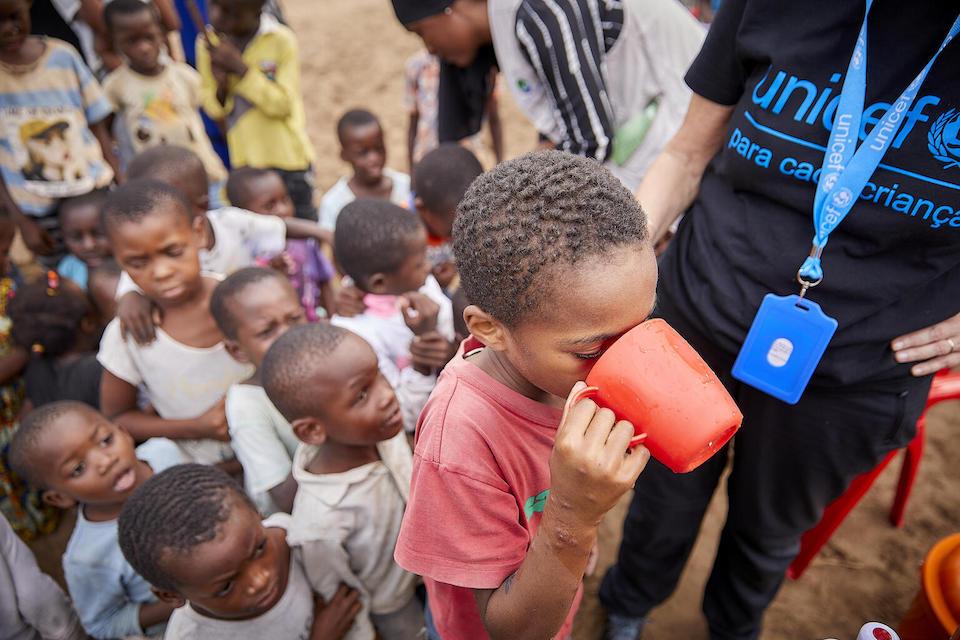
collaboration works to raise awareness in communities about hygiene and sanitation, cholera prevention and nutrition. © UNICEF/UN0823514/
Poor health, lack of education, substandard living conditions and the threat of violence overshadow many young lives. The risks weigh most heavily on women and girls.
Mozambique has experienced an annual onslaught of ferocious storms. Each brings destruction and disease.
Ongoing violence in Cabo Delgado and neighboring Nampula province has already uprooted more than 1 million people — 80 percent of them women and children — increasing their risks of gender-based violence and other abuses. Reports of severe violations against children include abductions and the recruitment and forced conscription of children by armed forces.
Less than 30 percent of children and teens complete primary education. Teen pregnancy is common, and far too many young girls marry early, jeopardizing their futures and their children's.
Once married, most women do not work outside the home, as they are expected to stay home and care for the children. They have little say over the decisions governing their lives.
A series of devastating storms for Mozambique — where extreme weather related to climate change is the new normal
Mozambique's eastern border stretches 1,550 miles along the Indian Ocean. Its pristine shoreline makes it a favorite among travelers. But its coastal communities are also highly vulnerable to extreme weather events related to climate change.
From 2016 to 2021, eight tropical storms hit Mozambique. Each caused massive widespread destruction of homes, farms and vital infrastructure like power lines, water systems and health facilities.
In 2019, Cyclones Idai and Kenneth ravaged the nation within a six-week time period, impacting 2.5 million people; in January 2021, Cyclone Eloise struck Sofala province — where people were still struggling to recover from Cyclone Idai. And in 2022, families in central and northern Mozambique bore the brunt of Tropical Storm Ana.
Cyclone Freddy hit Inhambane and Zambezia provinces in early March 2023 — wiping out the season's harvest and heightening food insecurity. Severe flooding compromised water and sanitation services, creating an ideal breeding ground for cholera — resulting in a massive outbreak.
How UNICEF is helping children in Mozambique
Since 1975, UNICEF and its partners have been on the ground in Mozambique to help children survive, grow and thrive. UNICEF is there to deliver emergency relief in the wake of devastating storms, and works with local partners to help communities build back better. UNICEF also focuses on assisting vulnerable children and families displaced by conflict.
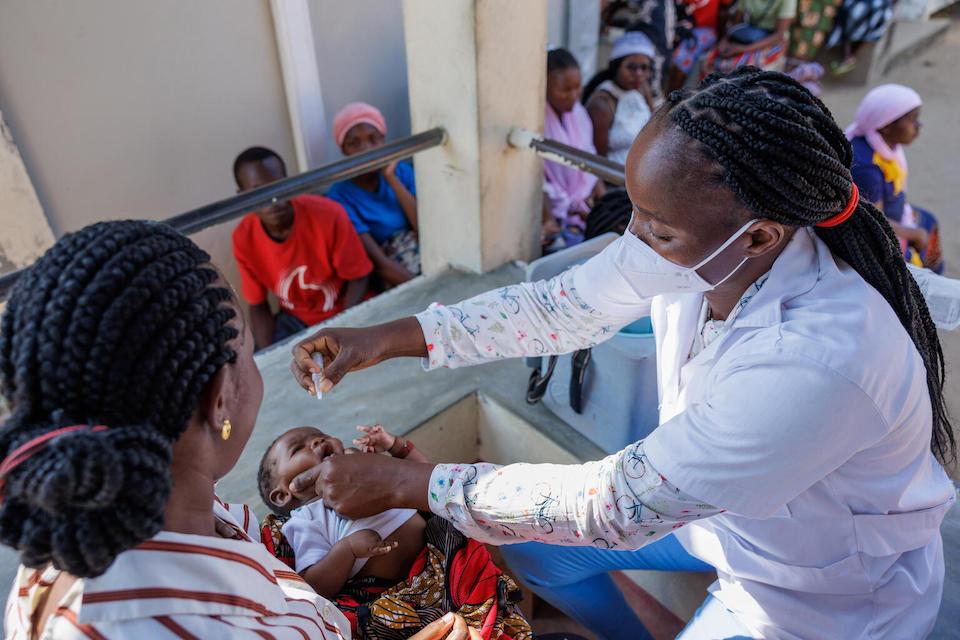
Ongoing program work aligns with the government's efforts to improve children's lives and advance progress toward the Sustainable Development Goals. Examples of recent and ongoing efforts include:
- Health: immunizing children against cholera, polio, measles and other vaccine-preventable diseases; strengthening cholera outbreak prevention and response
- Nutrition: providing children with nutrition support, including Vitamin A supplements and micronutrient powders, and treating children with severe acute malnutrition
- Education: setting up temporary learning spaces to help displaced children and others living in crisis zones continue with their education; supporting early learning and other education services, including for children with disabilities
- Water: providing emergency water, sanitation and hygiene kits while also improving overall access to safe water and sanitation in communities
- Child protection: preventing and responding to exploitation and gender-based violence; working with local partners to prevent and respond to child rights violations — and hold perpetrators accountable; supporting family reunification or alternative care for unaccompanied minors
- Social protection: providing cash assistance to tens of thousands of families who lost their livelihoods during the COVID-19 pandemic
- Climate resilience: training construction technicians, contractors and inspectors in post-disaster reconstruction, to help make schools and health centers better able to withstand cyclone force winds and rain
Learn more about what UNICEF does to help vulnerable children and families around the world.
Support UNICEF. Donate today.
